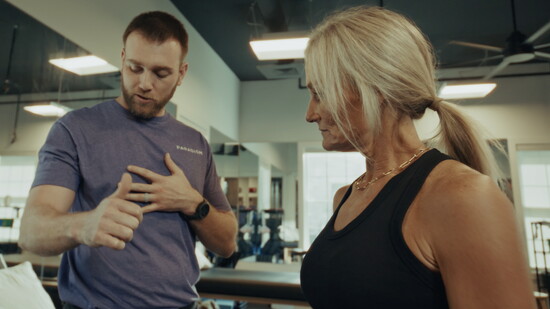Doctors David Edwards and Matt McEvoy, founders of Paradigm Health in Franklin, have implemented a healthcare model that is proactive and focused on preventing disease and increasing longevity, rather than the typical “reactive” healthcare where patients receive treatment only after a disease manifests. This model, known as Medicine 3.0, shifts from managing disease to maintaining good health and prolonging your life (lifespan), and ensuring we’re fit and functional enough to enjoy the extra years we live (healthspan).
For our women’s issue, Franklin Lifestyle sat down with Dr. Edwards and Dr. McEvoy to discuss how women can meet their health goals and live long and active lives. While women's health is usually associated with reproductive and gynecological issues, the
reality is more complex. “Heart disease is a bigger threat to women’s health than the typical things we think of, like breast cancer,” says Dr. McEvoy. “Women are at risk for chronic conditions, including metabolic disorders, dementia, cancer, osteoporosis. Heart disease is the leading cause of death in women, surpassing cancer.”
“That’s why our approach is comprehensive,” says Dr. Edwards. “A workup needs a whole health approach. We spend much more time with our patients than most physicians. It takes time to get to know a person, to listen and learn. Our initial workup takes four hours, with at least a couple more hours of discussion about what matters to you and how we can tailor treatments to you based on your history, your biomarkers, and your health goals.”
“Health experiences are unique to every person,” Dr. Edwards continues. “Just giving someone a supplement might make them feel better, worse, or no different. It’s important to first identify the source of a condition and then to be able to measure a benefit of any treatment so that we can monitor improvement over time. We start with a broad screening to obtain information about a dozen different health risks. Then we’ll decide together the best paths to help us reach your goals. It’s your path and your journey, and we’ll be your trail guides.”
Of course, perimenopause and menopause are major issues in women’s health. Every day, 6,000 women in the United States enter menopause, yet less than ten percent have proactive and meaningful conversations with their doctors about the transition. “Menopause is often reduced to symptoms like hot flashes and mood swings, but its effects extend beyond these," says Dr. McEvoy. “The drop in estrogen increases the risk of heart disease, diabetes, poor bone health, and colorectal cancers, not to mention things like frozen shoulder, weight gain, changes in sleep, and brain fog. If you start hormones within ten years of menopause, your risk of
developing these issues goes down substantially."
“While there was a concern about safety of hormone replacement based on some research published in the early 2000s, those initial findings have been walked back and corrected," continues Dr.McEvoy "But the new understanding of the importance of personalized hormone replacement has not been publicized as it should be. Now the question is, ‘What’s right for you?’ Personalized healthcare approaches are critical so that women attain optimal health during all life stages."
For example, a woman experiencing poor sleep might be going through a life stage change, such as being postpartum, in perimenopause or menopausal, or she might have thyroid issues, hormonal imbalance, or even have metabolic disease.
”It could be a simple thing like a busy life balancing many duties that doesn’t allow much time for exercise or an early sign of an underlying health condition,” says Dr. Edwards, “But how will we know if we don’t dive in? When a patient says that things feel ‘off,’ we’ll talk about how her life is changing. Stress at work, having a baby, caring for aging parents, moving to a new city, or traveling across time zones– these challenges can upend her exercise routine, sleep, and nutrition.”
The doctors agree that discussing a patient’s goals is key to guiding them along a healthy path. “Whether she wants to maintain a career, run a race, or be a mom or an active grandparent, we have a conversation about what needs to happen to accomplish these goals and partner with our patients to reach them,” says Dr. Edwards. “Women’s healthcare is as broad as the goals that women have. Together we can draft a plan that’s specific to you and where you are on your journey.”
“We of course write prescriptions when they’re needed,” says Dr. McEvoy, “but our first prescriptions will revolve around exercise, nutrition, sleep hygiene, cognitive and emotional wellness, along with vitamins, supplements, and bioidentical hormones. Each of these pieces requires tailoring a plan specific for each woman and her health and wellness goals.”
The team at Paradigm Health also includes nurse and care coordinator Sarah Bolz, physical therapist Griffin Moore, practice manager Cait Carnahan, and member experience coordinator Naomi Donalson. As a team, they aim to provide the highest level of medical care combined with exceptional hospitality. While they employ cutting-edge technology, the calming environment of the practice makes the patient experience feel more like a visit to a spa or five-star hotel than a typical cold doctors’ office.
ParadigmHealth.org
